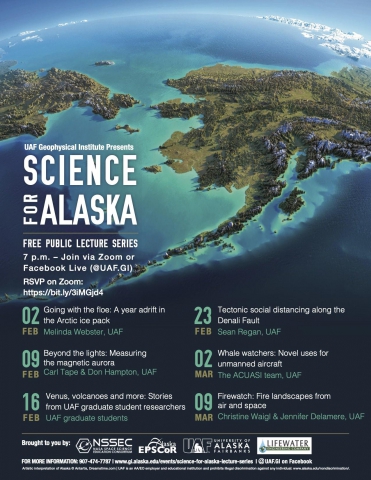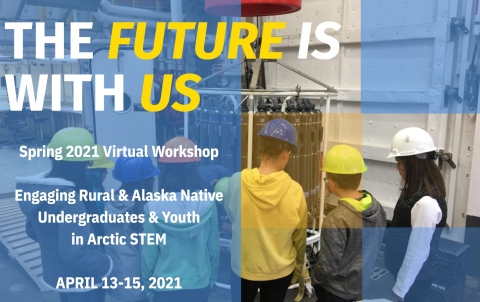The Arctic Research Consortium of the United States (ARCUS), the Interagency Arctic Research and Policy Committee (IARPC) Arctic STEM collaboration team, and the Arctic STEM Workshop Steering Committee, would like to announce an upcoming National Science Foundation funded workshop: Engaging Rural and Alaska Native Undergraduates and Youth in Arctic STEM, to be held online April 13-15, 2021.
The Arctic is changing at an unprecedented rate, with consequences for Arctic residents—particularly Indigenous Peoples. Along with these changes are new challenges and a growing need to engage and train the next generation in Science, Technology, Engineering, and Mathematics (STEM) fields that are specifically focused on the Arctic.
The goal of this workshop is to bring together rural and Alaska Native undergraduates and youth, federal agency representatives, researchers on Arctic STEM projects, Indigenous faculty, and community members to discuss the gaps, challenges, opportunities, and successful practices to increase and support the representation of rural and Alaska Native undergraduates and youth in STEM education and career pathways. To ensure this process of learning doesn't replicate the top-down, outside-in model that can be extractive, our virtual workshop will include a collaborative process with all participants and interested organizations. This effort will produce recommendations for systemic change focused on increasing rural and Alaska Native and undergraduates and youth to consider entering STEM fields in Arctic Alaska.
The workshop will discuss the following topics:
- Broadening the understanding of key barriers, challenges, and opportunities in engaging rural and Alaska Native undergraduates and youth in Arctic STEM fields
- Communicating specific strategies and best practices that are successful in engaging rural and Alaska Native undergraduates and youth in Arctic STEM programs and in workforce development
- Share perspectives on what is working and what needs to change
- Discuss ways in which workshop participants can advance individual and collective efforts towards increasing rural Alaskan and - - Alaska Native undergraduates and youth in Arctic STEM education and career pathways
Submit your interest form no later than Monday, March 8, 2021, by 5 PM AKST, if you'd like to participate in this online workshop.
Interested applicants will be notified (via email) of the final decision by Monday, March 15, 2021, of their participation status.
Please follow the link above for more information.


